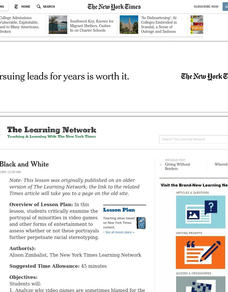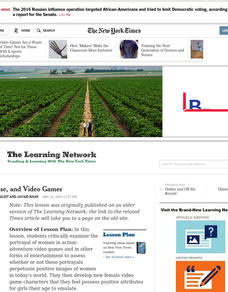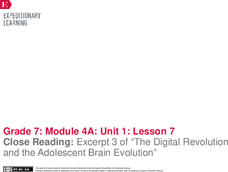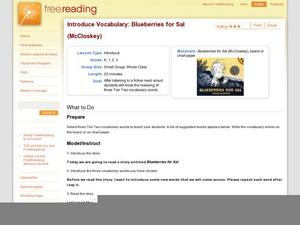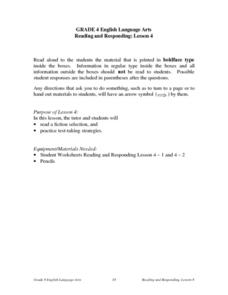The New York Times
Collateral Damage? Researching a Connection Between Video Games and Violence
Hook your class into an exploration of and discussion about violence in video games with a cute animal clip and a video game trailer. After a quick discussion about how media can affect mood, class members read a related article and...
Curated OER
Video Game Violence: Explore Possible Impacts
Introduce middle schoolers to the issue of video game violence with a multifaceted approach. Learners complete a gaming survey, as well as read and discuss a news feature about violent video game sales and a handout on stimulus...
Media Smarts
Violence and Video Games
Widespread video gaming makes this content relevant and high interest. Developing youth awareness about the impact of violence in games is important to promote literacy, critical thinking, health, and consumer awareness. After reading...
Anti-Defamation League
Is Gaming a Boy's Club? Women, Video Games and Sexism
High school juniors and seniors investigate the representation of women in video games. They watch a video of researcher Anita Sarkeesian who describes the response to her research attempts, and read articles related to the topic. To...
Deliberating in a Democracy
Violent Video Games
High schoolers examine violence in video games. In this American history instructional activity, students read an article on the link between video games and violence. High schoolers respond to discussion questions and debate the topic.
Curated OER
The Inside Dope on Video Games
Students explore the claim that video games that glorify violence and illegal activities also promote such activities in the real world. They choose sides and perform a mock trial on the issue.
Media Smarts
First Person
High schoolers explore the relationship between video games and actual population. Example: A 2005 study showed Latino youth play at higher rates than other groups, but there are no Latino playable characters. They watch a brief video...
Curated OER
Beyond Black and White
Students critically examine the portrayal of minorities in video games and other forms of entertainment and assess the role of racial stereotyping. They keep a log of media minority portrayals and respond to their findings.
EngageNY
Finding Relevant Information and Asking Research Questions: The Benefits of Video Games
Video games may not be so bad after all. As scholars read the text "The Many Benefits, for Kids, of Playing Video Games," they summarize the gist in their researchers' notebooks. Next, pupils draft supporting research questions based on...
Curated OER
Sex, Guise, and Video Games
Students examine the portrayal of women in action-adventure video games and in other forms of entertainment to assess whether or not these portrayals perpetuate positive images of women in today's world. They develop new female video...
EngageNY
Close Reading: Excerpt 3 of “The Digital Revolution and the Adolescent Brain Evolution”
It's time to level up and discover how video games affect the brain. Pupils explore the topic as they continue reading excerpts from an article about adolescent brain development and the digital revolution. Scholars also participate in a...
EngageNY
Contrasting Evidence: “Games Can Make a Better World” and “Video Games Benefit Children, Study Finds”
Anecdotes, analogies, testimonies, statistics. The most powerful arguments rely on multiple types of evidence. Scholars explore the topic as they read contrasting evidence about the benefits of video games. They complete Venn diagrams to...
Curated OER
Flight of the Imagination
Learners study the success of video games by reading an online article. They work in groups to design settings, storylines, characters and technical features for their own fantasy video games. Finally, they write scripts for previews of...
Curated OER
The Gypsy Game
In this reading worksheet, students answer 10 multiple-choice questions about the book. For example, "What did Marshall name the stray dog?"
Curated OER
Answering Carnival Questions with the Scientific Method
Through the use of a Reading Rainbow episode, clever in-class games and activities, and an ITV Series video, second and third graders engage in a study of the scientific method; what it is, and how scientists use it. This well-designed...
Curated OER
Playing Dirty
Learners consider the effects of video games on students. In this current events lesson, learners visit selected websites to study video game ratings, their effects on children, and the violence in the games.
Curated OER
Virtual Connections
Students use prior knowledge to develop a survey on their peers' habits and preferences regarding video games and online gaming. They examine the social aspect of online gaming by discussing "Where Warriors and Ogres Lock Arms Instead of...
Curated OER
Introduce Vocabulary: Blueberries for Sal (McCloskey)
Take your budding readers on a literary trip to pick blueberries as they learn vocabulary from Robert McClosky's book, Blueberries for Sal. By pre-teaching the words pupils are prepared to raise their hands when they hear the words in...
Nemours KidsHealth
Screen Time: Grades 6-8
How much screen time is too much screen time? Even before COVID, tweens were spending hours watching TV, playing video games, and connecting with their friends by smartphone and computers. Two activities from Kids Health get young...
Curated OER
Origin of the Modern Olympic Games
Students using a Venn diagram, compare and contrast the modern and ancient Olympic games. They write essays and construct timelines about the games. Students, using various items, create tools for a new Olympic game and write the...
Curated OER
Reading and Responding -- Lesson 4
Fourth graders work individually with a tutor or teacher to (1) read a fiction selection, and (2) practice test-taking strategies. Reading passages and comprehension questions are provided.
US Holocaust Museum
Nazi Olympics: Berlin 1936
The Olympics are about more than sports—at times, the games are also a place of racism and prejudice! Pupils investigate the 1936 Olympics in Berlin, Germany. They analyze the meaning behind the materials included in the United States...
Nemours KidsHealth
Screen Time: Grades 9-12
Two engaging activities encourage teens to turn off their screens and tune into healthy activities. Learners use a tracker to assess their daily screen-time habits, read several articles about the value of exercise, then research the...
Curated OER
Playing to Learn
Learners brainstorm about video games that are designed to teach. They create and perform in small groups a live action "video game" that teaches a concept covered in class this school year.









